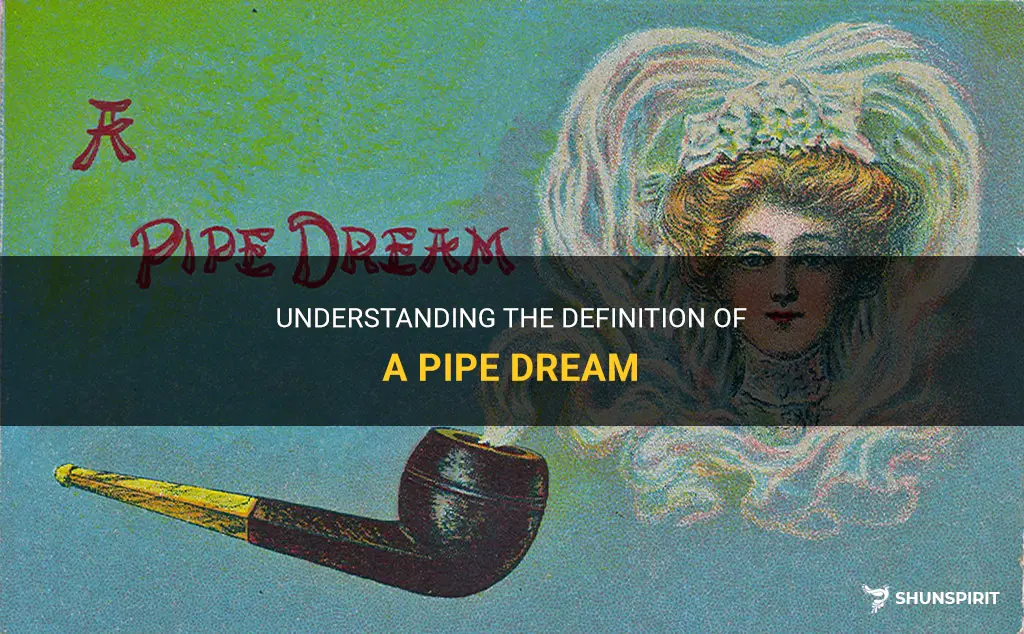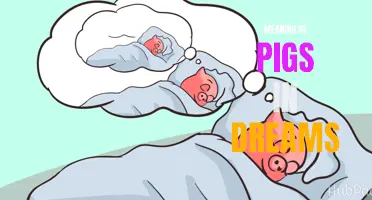
Have you ever had a lofty aspiration or seemingly unattainable goal that you couldn't help but daydream about? Well, that's what we call a pipe dream. This term originated from the notion of smoking opium through a pipe, which would induce euphoric and fantastical visions. In modern context, a pipe dream refers to an unrealistic or impractical idea or ambition, often dreamt of during idle moments. So, if you find yourself lost in thoughts about achieving the impossible, get ready to dive into the captivating concept of pipe dreams.
| Characteristics | Values |
|---|---|
| Meaning | Something that is extremely unlikely to happen or be achieved |
| Origin | The term "pipe dream" originated from the idea of smoking opium through a pipe, which often led to seemingly vivid and imaginative dreams |
| Usage | It is commonly used to describe a hope or idea that is unrealistic or impractical |
| Synonyms | Fantasy, wishful thinking, illusion, delusion |
| Example | "His dream of becoming a professional athlete is just a pipe dream." |
| Related phrases | Pie in the sky, castles in the air, daydream |
| Related concepts | Unattainable goals, unrealistic aspirations |
| Popularity | The phrase "pipe dream" is commonly used in English-speaking countries |
| Variations | Some variations include "pip |
What You'll Learn

What does the phrase pipe dream mean?
A pipe dream refers to an idea or plan that is highly unlikely or impractical to achieve. It is a term often used to describe unrealistic aspirations or goals. But what does this phrase really mean, and where did it originate? In this article, we will delve into the definition, origin, and examples of pipe dreams.
The term "pipe dream" originated in the late 19th century and was inspired by the fantasies induced by smoking opium through a pipe. Opium smoking was popular during this time and often resulted in dreamy states and unrealistic ideas. People would indulge in opium pipes, and their minds would wander off into a world of imagination and unattainable desires. Hence, the term "pipe dream" was born as a way to depict unachievable fantasies or goals.
In modern usage, a pipe dream refers to an idea or plan that is so impractical or far-fetched that it is highly unlikely to be realized. It is essentially a daydream or wishful thinking that holds little or no basis in reality. The concept of a pipe dream implies that while the idea may be appealing or desirable, it is not feasible or realistic in practical terms.
To better understand the notion of a pipe dream, let's delve into a few examples. Imagine someone dreaming of running a marathon without ever having trained or possessing the physical capabilities to do so. While running a marathon may be a noble goal, if the person is not prepared or lacks the necessary skills and endurance, it becomes a pipe dream.
Similarly, someone aspiring to become a professional singer without any vocal training or natural talent may be pursuing a pipe dream. While it is not impossible for individuals to improve their singing abilities through dedicated practice and training, having no foundation or aptitude in the field makes the goal unrealistic.
Another common example of a pipe dream is someone aiming to win the lottery without buying a ticket. Winning the lottery requires luck and chance, but without actively participating, it remains a mere daydream.
It is essential to distinguish pipe dreams from realistic goals. Realistic goals are achievable and can be accomplished with determination, effort, and planning. Pipe dreams, on the other hand, lack these factors and often stem from wishful thinking or unrealistic expectations.
In conclusion, a pipe dream is an idea or plan that is highly unlikely or impractical to achieve. The origins of the term can be traced back to opium smoking in the late 19th century. Pipe dreams are unrealistic goals or aspirations that hold little or no basis in reality. Examples of pipe dreams include pursuing a career without the necessary skills or qualifications, aiming for a physical feat without proper preparation, or hoping for a chance without active participation. It is important to distinguish pipe dreams from realistic goals to ensure productive and attainable outcomes.
The Biblical Symbolism of Cookies in Dream Interpretation
You may want to see also

Where does the term pipe dream originate from?
The term "pipe dream" is often used to refer to a hope or a fantasy that is unlikely to happen. But where does this peculiar phrase originate from?
The origin of the term "pipe dream" can be traced back to the late 19th century. It was first coined in the United States during the era of the transcontinental railroad construction. During this time, many thousands of workers, also known as "railroad men," would laboriously lay down tracks and construct tunnels to connect the east and west coasts. This was a monumental task that required a tremendous amount of effort and dedication.
The long and exhausting workdays often left these workers longing for a moment of rest and relaxation. Many of them found solace in smoking pipes, which became a common pastime during breaks. As they rested and smoked, they would often drift off into daydreams and imagine a more comfortable and peaceful life.
These daydreams became known as "pipe dreams" because they were indulged during moments of respite and relaxation while smoking a pipe. The term "pipe dream" gradually evolved to represent any grand or impractical fantasy, much like the daydreams of the railroad men.
The phrase gained widespread popularity and usage during the early 20th century and has since become a part of the English language. It is now commonly used to refer to any unrealistic or unattainable goal or idea.
Today, the term "pipe dream" is not limited to railroad workers or the act of smoking a pipe. It has taken on a broader meaning and can be used to describe any situation where someone entertains an unrealistic hope or ambition.
For example, someone who dreams of becoming a successful actor without any training or experience may be said to have a pipe dream. Similarly, someone who hopes to win the lottery as their retirement plan is indulging in a pipe dream.
In conclusion, the term "pipe dream" originates from the daydreams of railroad men during moments of rest and relaxation while smoking pipes. Over time, it has come to represent any unrealistic or unachievable hope or ambition. It is a widely used phrase in the English language, helping to describe situations where people indulge in grand fantasies without considering their practicality.
The Symbolic Interpretation of a Cougar Attacking in Dreams
You may want to see also

Is a pipe dream the same as a fantasy or daydream?
An interesting question that often arises is whether a pipe dream is the same as a fantasy or daydream. While these terms may seem interchangeable on the surface, there are distinct differences between them when examined closely.
A pipe dream refers to an idea or goal that is unrealistic or impractical. It is a concept that seems highly unlikely to become a reality. This term originated from the notion of someone smoking an opium pipe and having grandiose thoughts or visions. In modern usage, a pipe dream is often used to describe ambitious aspirations that are unlikely to be achieved.
On the other hand, a fantasy or daydream is a pleasant and imagined scenario that an individual envisions in their mind. These mental images can range from simple thoughts to elaborate storylines. Daydreams and fantasies often provide an escape from reality and can be a source of entertainment or relaxation.
While both pipe dreams and fantasies are products of the imagination, the key distinction lies in their practicality or feasibility. A fantasy or daydream can be a harmless and enjoyable pastime, providing a temporary reprieve from the stresses of daily life. It allows individuals to indulge in their creative thoughts and explore alternative realities.
A pipe dream, however, typically refers to an unrealistic or impractical goal. It may be based on wishful thinking or a lack of understanding of the practical steps required to achieve the desired outcome. Pipe dreams often lack a solid foundation and may ignore the limitations or obstacles that stand in the way.
To provide a clearer understanding of the differences, let's consider an example. Imagine a person who dreams of becoming a famous actor. They may spend their days envisioning themselves on the red carpet, receiving awards and accolades. This is a fantasy or daydream as it offers an imaginative escape and brings joy to the individual.
However, if this person has no acting experience, no connections in the industry, and no plan to pursue acting professionally, their dream of becoming a famous actor would be considered a pipe dream. It lacks the necessary steps, effort, and realistic expectations required to turn it into a feasible goal.
In summary, while both pipe dreams and fantasies involve imaginative thinking, they differ in their practicality and feasibility. A fantasy or daydream is a pleasurable escape that allows individuals to explore their creative minds. A pipe dream, on the other hand, is an unrealistic or impractical goal that often lacks the necessary steps or understanding to become a reality. It is important to distinguish between the two to set realistic expectations and focus efforts on achievable aspirations.
Understanding the Symbolism of Snake Attacks in Dreams
You may want to see also

Can pipe dreams be achievable goals, or are they always unrealistic?
We often hear the term "pipe dream" used to describe an unrealistic or fanciful goal that is unlikely to be achieved. However, it is important to recognize that not all pipe dreams are created equal, and what may seem unrealistic at first glance can sometimes be turned into achievable goals with the right approach and determination.
Firstly, it is important to define what we mean by a pipe dream. A pipe dream is typically a goal or aspiration that appears to be impractical or impossible to achieve. This could be due to factors such as lack of resources, knowledge, or previous failures. However, it is crucial to remember that many successful individuals have started with what others would consider to be pipe dreams.
One example is Elon Musk, the founder of SpaceX and Tesla. His goal of colonizing Mars and disrupting the electric car industry may have seemed like pipe dreams to some, but he has made significant progress towards achieving these goals. SpaceX has successfully launched and landed reusable rockets, and Tesla has become a leading player in the electric car market. Musk's success shows that even the most seemingly unrealistic goals can be achieved with the right vision, determination, and hard work.
So how can we turn pipe dreams into achievable goals? It starts with a clear vision and breaking down the goal into smaller, more manageable steps. For example, if your pipe dream is to write a bestselling novel, you can start by setting smaller goals such as writing a certain number of pages or chapters each day. By breaking it down into smaller tasks, the goal becomes more achievable and less overwhelming.
Another key factor in turning pipe dreams into achievable goals is developing the necessary skills and knowledge. This may require investing time and effort into learning and gaining experience in the relevant field. If your pipe dream is to become a professional musician, for example, it is crucial to practice regularly, take lessons, and learn from experienced musicians. By continuously improving your skills, you increase your chances of turning your pipe dream into a reality.
Moreover, having a support system and surrounding yourself with like-minded individuals can greatly increase your chances of achieving your goals. This support system can provide guidance, motivation, and accountability, which are crucial in staying focused and overcoming obstacles along the way.
It is also important to remain adaptable and open to new opportunities and possibilities. Often, the path towards achieving our goals may not be a straight line, and we may need to make adjustments along the way. Being willing to adapt and embrace change can help us navigate the challenges and setbacks that we may encounter.
In conclusion, while pipe dreams may initially seem unrealistic, they can be turned into achievable goals with the right approach and mindset. By breaking down the goal into smaller steps, developing the necessary skills and knowledge, building a support system, and remaining adaptable, we can increase our chances of turning our pipe dreams into reality. So, don't dismiss your dreams as mere fantasies. With determination and hard work, they can become tangible achievements.
The Biblical Interpretation of a Red Car in a Dream
You may want to see also

How can one differentiate between a pipe dream and a realistic aspiration?
Setting realistic aspirations is an essential part of personal growth and success. However, it can sometimes be difficult to differentiate between a pipe dream, which is an unrealistic goal, and a realistic aspiration. In this article, we will explore some key factors that can help distinguish between the two.
- Clarity and Specificity: A realistic aspiration is often well-defined and specific, while a pipe dream is more vague and grandiose. For example, a realistic aspiration might be to start a successful small business within the next two years, while a pipe dream might be to become a billionaire overnight. By setting clear and specific goals, you can make it easier to determine if they are achievable or not.
- Feasibility and Resources: Consider the feasibility of your aspiration. Do you have the necessary resources, such as time, money, and skills, to achieve your goal? A pipe dream often involves unrealistic expectations or requires resources that are clearly unattainable. On the other hand, a realistic aspiration takes into account the available resources and aligns them with achievable goals.
- Timeframe: Timeframe plays a crucial role in differentiating between a pipe dream and a realistic aspiration. A realistic aspiration typically involves setting a timeline and breaking down the goal into smaller, manageable steps. A pipe dream, on the other hand, may have no specific timeline or may have an unrealistic timeline that is clearly unattainable.
- Personal Motivation and Commitment: Evaluate your personal motivation and commitment to achieving the goal. Are you truly dedicated to putting in the necessary effort and making the necessary sacrifices to reach your aspiration? A realistic aspiration often requires hard work, perseverance, and determination. If you are not genuinely motivated or committed to working towards your goal, it may be more of a pipe dream.
- Consultation and Feedback: Seek advice and feedback from trusted mentors, peers, or professionals in the field related to your aspiration. They can provide valuable insights and help you identify if your goal is realistic or just a pipe dream. Often, an outside perspective can shed light on the feasibility of your aspirations and guide you towards more achievable goals.
Examples:
- John dreams of becoming a professional basketball player. He has been playing basketball casually for a few years but has never received any formal training. He is in his late 30s and has a full-time job. While it is certainly not impossible for someone to start playing basketball professionally later in life, John's lack of training and age make it more of a pipe dream. A more realistic aspiration might be to join a local basketball league and improve his skills while enjoying the sport.
- Sarah, on the other hand, has been working in the finance industry for several years and has a deep understanding of investments. She aspires to start her own investment firm and help people grow their wealth. Sarah has a clear plan, has saved up some capital, and has already started networking with potential clients and partners. Her aspiration of starting an investment firm is much more realistic and achievable, given her experience and resources.
In conclusion, differentiating between a pipe dream and a realistic aspiration requires careful consideration of factors such as clarity, feasibility, timeframe, personal motivation, and external feedback. By setting realistic goals, you can increase your chances of success and avoid wasting time and energy on unattainable dreams.
The Symbolism of Dreams: Unveiling the Secrets of the Beach
You may want to see also
Frequently asked questions
"Pipe dream" refers to an unrealistic or extravagant idea or plan that is unlikely to happen.
The term "pipe dream" originated from the idea of smoking opium through a pipe, which often led to fanciful and unrealistic hallucinations.
While possible, a "pipe dream" is typically seen as an unrealistic goal or aspiration that is rarely achievable. However, with perseverance and hard work, some pipe dreams can become reality.
Yes, a "pipe dream" is often seen as an impractical or impossible aspiration, while a goal is something that is achievable and can be worked towards with a realistic plan.








4 Comments
Aleena Frost
Anjana Sahney Thakker
AuthorTessa Kramer
Anjana Sahney Thakker
Author